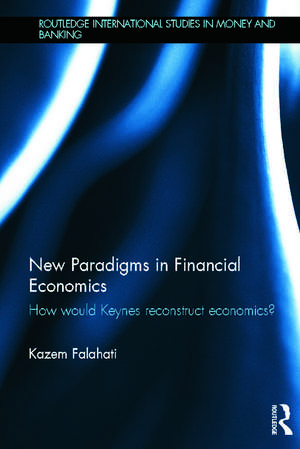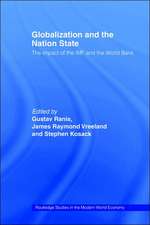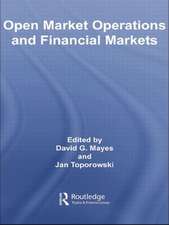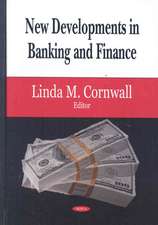New Paradigms in Financial Economics: How Would Keynes Reconstruct Economics?: Routledge International Studies in Money and Banking
Autor Kazem Falahatien Limba Engleză Hardback – 26 oct 2012
On the other hand, the founders of the currently dominant theories in economics and finance (i.e. the standard paradigm) such as Walras (1834-1910), Modigliani (1918-2003) and Miller (1923-2000) have identified mathematical contradictions within their own foundational models, the root cause of which no one has yet discovered. The standard paradigm has thus lost the reason for its existence in the light of experience, experiments and logical rigour. This book identifies the heuristic cause of these external and internal contradictions of the standard paradigm and remedies these problems by offering a new paradigm which can explain and predict observed economic behaviour, and resolve the extant behavioural, empirical and experimental puzzles.
The new paradigm offers a dramatically improved understanding of economic behaviour at the micro as well as macro level of the economy within an over-arching framework comprising the real and the financial sectors. It does so in a rigorous but simple and clear way, using an axiomatic approach. It also offers policy recommendations on how the economy should be managed to avoid severe swings. It therefore is of great interest to scholars and practitioners in economics and finance.
| Toate formatele și edițiile | Preț | Express |
|---|---|---|
| Paperback (1) | 410.46 lei 6-8 săpt. | |
| Taylor & Francis – 4 iul 2014 | 410.46 lei 6-8 săpt. | |
| Hardback (1) | 1056.00 lei 6-8 săpt. | |
| Taylor & Francis – 26 oct 2012 | 1056.00 lei 6-8 săpt. |
Din seria Routledge International Studies in Money and Banking
-
 Preț: 325.16 lei
Preț: 325.16 lei -
 Preț: 313.60 lei
Preț: 313.60 lei -
 Preț: 284.40 lei
Preț: 284.40 lei -
 Preț: 341.55 lei
Preț: 341.55 lei -
 Preț: 311.41 lei
Preț: 311.41 lei -
 Preț: 309.94 lei
Preț: 309.94 lei -
 Preț: 307.47 lei
Preț: 307.47 lei -
 Preț: 313.17 lei
Preț: 313.17 lei - 9%
 Preț: 864.83 lei
Preț: 864.83 lei -
 Preț: 664.76 lei
Preț: 664.76 lei - 18%
 Preț: 1056.00 lei
Preț: 1056.00 lei - 18%
 Preț: 1175.01 lei
Preț: 1175.01 lei - 18%
 Preț: 1122.64 lei
Preț: 1122.64 lei - 24%
 Preț: 148.98 lei
Preț: 148.98 lei - 18%
 Preț: 1067.14 lei
Preț: 1067.14 lei - 25%
 Preț: 503.80 lei
Preț: 503.80 lei - 18%
 Preț: 1058.79 lei
Preț: 1058.79 lei - 26%
 Preț: 820.40 lei
Preț: 820.40 lei - 18%
 Preț: 1058.79 lei
Preț: 1058.79 lei - 28%
 Preț: 821.46 lei
Preț: 821.46 lei - 18%
 Preț: 1057.40 lei
Preț: 1057.40 lei - 26%
 Preț: 765.01 lei
Preț: 765.01 lei - 18%
 Preț: 1056.28 lei
Preț: 1056.28 lei - 15%
 Preț: 254.03 lei
Preț: 254.03 lei - 18%
 Preț: 1064.70 lei
Preț: 1064.70 lei - 18%
 Preț: 1113.25 lei
Preț: 1113.25 lei - 18%
 Preț: 702.31 lei
Preț: 702.31 lei - 18%
 Preț: 1166.68 lei
Preț: 1166.68 lei - 26%
 Preț: 849.37 lei
Preț: 849.37 lei - 18%
 Preț: 1116.38 lei
Preț: 1116.38 lei - 25%
 Preț: 851.99 lei
Preț: 851.99 lei - 18%
 Preț: 1060.87 lei
Preț: 1060.87 lei - 25%
 Preț: 823.57 lei
Preț: 823.57 lei - 18%
 Preț: 1114.70 lei
Preț: 1114.70 lei - 25%
 Preț: 824.53 lei
Preț: 824.53 lei - 29%
 Preț: 1188.26 lei
Preț: 1188.26 lei - 25%
 Preț: 853.07 lei
Preț: 853.07 lei - 18%
 Preț: 1114.30 lei
Preț: 1114.30 lei -
 Preț: 418.22 lei
Preț: 418.22 lei - 30%
 Preț: 854.10 lei
Preț: 854.10 lei - 18%
 Preț: 1060.25 lei
Preț: 1060.25 lei - 18%
 Preț: 1165.73 lei
Preț: 1165.73 lei - 30%
 Preț: 851.82 lei
Preț: 851.82 lei - 18%
 Preț: 1059.48 lei
Preț: 1059.48 lei - 18%
 Preț: 1240.95 lei
Preț: 1240.95 lei - 26%
 Preț: 1187.46 lei
Preț: 1187.46 lei - 18%
 Preț: 1341.98 lei
Preț: 1341.98 lei - 15%
 Preț: 698.43 lei
Preț: 698.43 lei
Preț: 1056.00 lei
Preț vechi: 1287.80 lei
-18% Nou
Puncte Express: 1584
Preț estimativ în valută:
202.06€ • 210.97$ • 167.23£
202.06€ • 210.97$ • 167.23£
Carte tipărită la comandă
Livrare economică 05-19 aprilie
Preluare comenzi: 021 569.72.76
Specificații
ISBN-13: 9780415631020
ISBN-10: 0415631025
Pagini: 224
Ilustrații: 22 b/w images, 4 tables and 22 line drawings
Dimensiuni: 156 x 234 x 14 mm
Greutate: 0.49 kg
Ediția:1
Editura: Taylor & Francis
Colecția Routledge
Seria Routledge International Studies in Money and Banking
Locul publicării:Oxford, United Kingdom
ISBN-10: 0415631025
Pagini: 224
Ilustrații: 22 b/w images, 4 tables and 22 line drawings
Dimensiuni: 156 x 234 x 14 mm
Greutate: 0.49 kg
Ediția:1
Editura: Taylor & Francis
Colecția Routledge
Seria Routledge International Studies in Money and Banking
Locul publicării:Oxford, United Kingdom
Public țintă
Postgraduate and UndergraduateCuprins
1 Introduction; Chapter 2 Irrational foundations of ‘rational’ behaviour in the standard paradigm; Chapter 3 Contradictions of the Marxian paradigm; Chapter 4 The new paradigm; Chapter 5 Resolution of puzzles in microeconomics; Chapter 6 Resolution of puzzles in finance; Chapter 7 Resolution of puzzles in macroeconomics; Chapter 8 Economic role of the State; Chapter 9 The recent global financial crisis; Chapter 10 Conclusion, policy and research recommendations
Notă biografică
Kazem Falahati is currently teaching International Financial Management at Glasgow Caledonian University, UK. He is an accountant-cum-economist by professional training. His experience includes senior managerial positions in both the financial and non-financial industries. He has advised major multinationals and financial institutions on their strategic investments and divestments as well as their financial structure, reporting and control with huge beneficial impact to their stakeholders.
Descriere
This book aims to provide a new framework of economic analysis for understanding and predicting how the economy works in the real world. It does this by re-examining the implicit and explicit foundational assumptions, and inherent contradictions of the standard paradigm.












